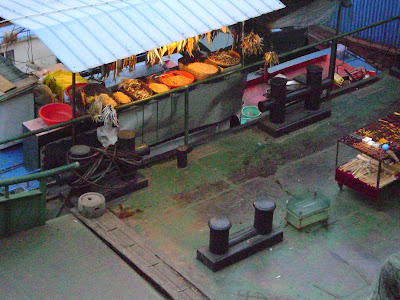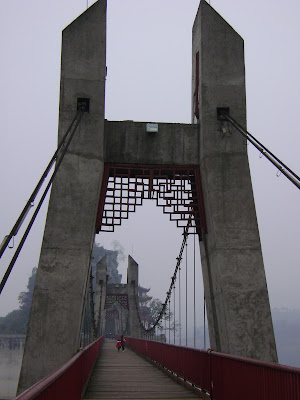Day
1
Our
home for five days on one of the world's best-known waterways. From
Shanghai we flew to Wuhan, a major river transportation hub in the
interior. On the trip from airport to the ship our local guide
peppered us with statistics about China's "urbanization"
movement that didn't explain the acres of forlorn, vacant
residential towers we were passing.
After
a day of airports and coach travel, our cabin on Century Diamond looks roomy
and pleasing with the bonus of a balcony. Dinner is typical
ship-style buffet, unlike our previous days of family-style round
table service. We are at Table 1 for the duration, same faces each
meal, designed to keep the staff on track. Our attendant is Coco. We
chatter about upcoming shore excursions to unfamiliar places. Sailing
upriver gets underway at midnight.
Day
2
SQUAWK!!
At 6 a.m., yes the ungodly hour of 6 a.m., the overhead tannoy
speaker system in each cabin BLARES wild Chinese music at us. Bolting
straight up from sleep, my roommate and I stare dumbly at each other.
There is no way to turn off the shattering racket. Then we are
subjected to shouted instructions about breakfast hours and an
excursion that is hours away. Followed by raucous bird noises that we
think are meant to be soothing. Happily, the cardiac-arrest business
is never repeated on subsequent days.
Today
(it's mid-March) is cooler, drizzling rain and windy. Since we are
awake anyway (!) we explore the ship. A few shops are on board,
including a tailor who makes custom cheongsams for about $200
from gorgeous silk fabrics. The ship library consists mostly of
Chinese magazines. There's a definite oversight, no information,
about what we are passing along the riverbanks; often mile after mile
of industrial mines, smelters, smokestacks. The few available
handouts are only regarding
the excursions. Some passengers go off to see a battlefield and fort
at Chibi,
within walking distance.
 |
| Fort Chibi |
 |
| Sun deck; no sun |
Nicer
just to unwind on the balcony and watch the river activity. We are
surrounded by flatlands where the river often widens / wanders into
lake formations and seems alarmingly shallow at times. Lots of river
traffic, many barges hauling freight. Gravel is coming downstream for
construction sites.
The
ship is not full ―
one or two Spanish and German groups, Canadians outnumbering
all ―
but meal times at the buffet can be a zoo. The Captain's
Welcome Party ensures a fair amount of champagne before the dinner
rush. Wine and beer are freely poured at meals which is not the norm
otherwise: one glass of beverage at each meal when travelling on
land.
Day
3
Excursion
later today, good. It's overcast but no fog, just the usual mid-level
layer of misty smog. On the ship entertainment program today:
"fashion show." Expecting a demonstration of traditional
costumes, we grabbed front seats. But it proved to be a sales pitch
for the tailor with two live models wearing cheongsams
who disappeared rapidly. The cruise director has an unfortunately
shrill voice and used the word "actually" about 45 times ―
this does not bode well for the
later "fresh water pearl presentation" and "scarf
wearing demonstration."
Happily,
the sun came out and the sundeck soon filled up. We are passing more
signs of life and cities now. The river water is looking deeper and
mountain peaks are appearing. Showing a film on the Three Gorges was
a bust; the ship does not have the facilities to show a film
effectively. Finally, it's time to go see the Three Gorges Dam up
close. Into a bus and up, up, up the road past Sandouping,
part of Yichang
city where the dam workers live.
It's
a hike at the heights for a magnificent view of the dam and the
locks. Hazy, but you can see everything. The size of the whole
complex is gigantic. Thirty-two main generators! It must take an army
to run the place. Maybe the army does run the place, heh. We
can see ships lifting in the locks, as our ship will do tonight. The
world's biggest dam is also installing the world's largest ship lift.
I quote from our little handout:
"The project produces clean electricity, prevents deadly floods downstream and enhances navigation. ... However, the dam has also flooded archaeological and cultural sites and displaced some 1.24 million people, and is causing dramatic ecological changes, including the risk of landslides. The decision to build the dam has been deeply controversial in China and abroad."
Twilight
approaches as we stop at the back of the dam for photo opps. The opps
are largely ignored by the female contingent as we discover a covey
of scarf vendors. Scarf-buying frenzy ensues ―
as it does at each new locale. It's dark when we reach the
ship and some holdup delays our boarding. The casual class of tai
chi ladies across the street do their best to entice us into a
small outdoor market. It works; we have time. Now the guys delight in
the availability of beer in six-packs.
Tonight's
post-dinner entertainment is a masked ball. The Spaniards and Germans
are really into all this jollity. Some of our group are being felled
by colds, not surprising as we are almost two weeks into the trip. At
10:30 p.m. Century Diamond enters the five-stage locks of the
spectacular dam. We will rise 101 metres. Once the gates close each
stage goes surprisingly quickly. It's awesome on the balcony facing a
concrete wall that slowly slides down as we go up. Amazingly, some
people have been able to scrawl bits of graffiti here and there (in
Chinese characters).
Day
4
First
thing, the morning excursion into Shennu Stream (aka Goddess Stream)
on small boats, each carrying about sixteen of us. It seems to be one
of the Three Gorges, but the ship handouts lack geographical
information/identification. This little side trip is a highlight,
amongst the soaring peaks. So much was submerged by the dam, turning
mountain tops into islands. The boats have rules: wear life jackets;
no more than five people outside on the stern. Soon the rules get
ignored and photographers crowd at the back. Tour manager Lisa uses
her severe voice.
There's
a stop at a tricky floating dock where we assemble on a rocky ledge.
The several boat guides line up, for something ceremonial perhaps?
Only the people directly at the front of the crowd can hear whatever
it is. Then they do a little song for us. Then they encourage us all
to join a sort of happy conga line. The treacherous floating dock
claims a few victims with twisted ankles and knees.
Back
at the ship, the glorious start to the day has become all grey and
cool. The passing scenery now is much more interesting, occasional
temples, wonderful bridges, cities, but also "surviving"
countryside spared the flood waters where family burial tombs can be
seen on the hills. The river is so GREEN now! Wushan
(not Wuhan) is one place where reconstruction is going on. A huge
riverside sign proclaims it: "China Excellent Tourism City;
National Sanitary City." Here we park for a while.
Some
groups go to White
Emperor City aka Baidi Cheng
aka
Baidi Temple,
an
optional tour entailing 1,000 stairs to the top. Luckily many old
temples were built on mountaintops and do not have to be
reconstructed. Meanwhile we
could explore the "street" along the floating dock we're
tied up to ―
foodstuffs, dried fish, nuts, drinks, water, tea, snacks, odds and
ends.
Docks/wharfs
of this type are necessary because they easily adapt to changing dam
levels. We see supplies coming along to be loaded onto the ship, all
carried manually of course. Bags of their famous oranges, what we
used to call mandarins.
Mild
anticipation at dinner about tonight's talent show. Selected
passengers model a few traditional women's costumes (again, a
too-brief look), self-consciously sashaying in and out. Our
neighbours from Table 2 do a limp rendition of the Expo song
CA-NA-DA. The irrepressible Spaniards do an overly long and
energetic but rather puzzling operetta (or so it seemed to be); their
soprano swathed herself in a bed coverlet to great effect, whisking
it expertly around her hips.
Day
5
Wakened
at 6:30 a.m. by firecrackers going off on the hill. We have stopped
again, at Zhongxian.
People are doing laundry in the river at the bottom
of steps. This is where we go to visit Shibaozhai, "Precious
Stone Fortress." Local guide Romy leads us through the town on
the south bank and a gauntlet of souvenir sellers to the fortress,
perched way, WAY above us. Aka the Red Pavilion, it's another temple
island-marooned by the dam flooding. Twelve stories and ninety-nine
stairs to climb. Each level is dedicated to a famous general,
scholar, or poet of the 200s AD, with cultural artifacts.
However.
In order to reach the bottom (entry) level, we must cross a
suspension bridge. It's about five feet wide which doesn't lessen the
terror of a very long, swaying, bouncy crossing. So call me
chicken-heart; queasiness with heights and unsteady sense of balance
are in full force. So why not shop instead, the other few cowards
suggest.
 |
| Not our ship but a reasonable facsimile |
Later
I am trying to capture more riverside views and burial tombs. The
ever-present smog throws a soft cast over all, reminiscent of old
watercolours.
Farewell
dinner tonight, self-served in the round. Expectation is high for the
special menu.
It
is loaded with fish and seafood dishes, to be expected in a marine
environment, but severely limits my choices. Love Chinese sausage but
had to spit out this version, heavy with fish taste! Apart from my
personal allergies, consensus from Table 1 was altogether a
disappointing, mediocre meal. Odd, and too bad, probably the least
memorable on a 24-day trip of otherwise delicious Chinese dishes.
Next
Day
We
are at Chongqing, our next destination. Coolies are taking our
luggage from the ship across the floating dock to the city; each man
carries a mind-boggling four suitcases on a bamboo yoke. We estimate
that's a minimum of 120 lbs. Poor buggers (but strong!), wonder what
their pay is. Then they return with supplies for the ship which will
turn around to take more groups on the downstream trip.
It's
really been quite a lovely time on the Yangtze, a lull in the hectic
pace of a long tour, somewhat like floating through a distant exotic
film. The passing scenes perhaps more than anything convey a sense of
the vastness, the beauties, of this country. But we also remember
seeing the work ethic, the daily routines, the cheerful greetings;
not so different from us after all.
©
2016 Brenda Dougall Merriman



























No comments:
Post a Comment